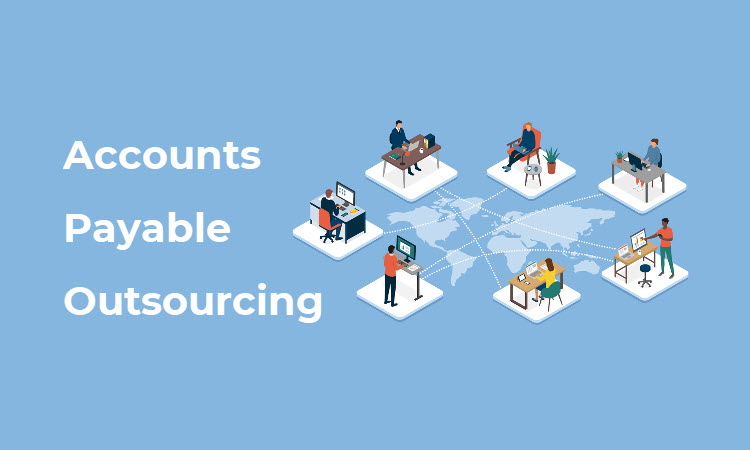As a business evolves, so does its workload. With increasing expenses, the pile of invoices waiting to be processed by the company’s accounting steadily grows.
Even though automation has significantly streamlined account payable processing, many businesses face the dilemma of either expanding their in-house accounting team or outsourcing part of the workload.
This article will explain the benefits and drawbacks of outsourcing and give you an unbiased overview of accounts payable.
What Are Accounts Payable?
Accounts payable (AP) is an accounting term that describes a company’s unpaid short-term debt to vendors and suppliers. Payables, as they are also known, are an IOU from one business to another, promising to pay for goods and services. Accounts payable expenses include:
- Raw materials
- Products and Equipment
- Transportation and logistics
- Energy
- Leasing
- Licensing
In the past, companies paid for goods and services on the spot with cash. But with the increasing complexity of today’s corporate structures, this has become almost impossible for two reasons. Firstly, the invoice from the vendor needs to go through a series of approvals, and secondly, the company needs time to manage its cash flow.
Efficient AP processing is essential for keeping finances in line and maintaining a good relationship with suppliers, as nobody likes late payments.
What Is Accounts Payable Outsourcing?
Accounts payable outsourcing is the process of hiring an outside company to conduct recurring invoice or bill-related tasks. The third party will perform any or all the functions listed below.
- Archiving invoice data such as vendor details, items, and amounts.
- Filling out purchase orders (PO) and receiving reports (or goods receipts).
- Reviewing and approving invoices and posting them in enterprise resource planning (ERP) software.
- Printing, signing, and mailing checks, completing electronic funds transfers via an Automated Clearing House (ACH) or through credit card payments, and sending remittance details to the vendor.
- Various analytical and value-added tasks related to accounts payable expenses.
In addition to providing these core services, AP outsourcing companies can also optimize internal processes and introduce new capabilities.
It is important to note that there are no one-size-fits-all solutions for accounting. The pros and cons of in-house and outsourcing largely depend on the context — what works for one company does not always work for another. It is up to the individual company to weigh the potential risks and rewards and decide on an approach that fits them.
Note: To get the complete picture of what ecommerce accounting is all about, check out our Comprehensive Guide to Ecommerce Accounting.

Challenges of In-House Accounts Payable
Let us consider the reasons why a company might consider outsourcing accounts payable.
HR Challenges
Having an in-house team comes with more responsibility than outsourcing, and the bigger the team, the more difficult it is to manage. The in-house approach comes with challenges such as:
- Employee engagement and morale
- Attracting and hiring talent
- Managing employee relationships
- Training and development
- Talent retention
- Diversity in the workplace
When outsourcing, none of the issues mentioned are the hiring company’s responsibility. Additionally, they apply more to large businesses and less to smaller ones that often have a single bookkeeper, sometimes even the business owner themselves handling accounts payable.
Potentially Costly Mistakes
Going the in-house route raises the risk of costly accounting mistakes because companies often relegate bookkeeping duties to only one person.
Having a single bookkeeper or AP clerk is often the only profitable way to do it in-house. Still, it is also inherently riskier than outsourcing to specialists who work as part of a team that is double-checking for mistakes. In-house AP clerks are also commonly overworked in the growth period of a company, making them more prone to costly slip-ups.
The company is also responsible for ensuring the bookkeeper stays updated on the latest technology, regulations, and tax codes. Inevitably, even the best education becomes obsolete with time, and a company loses efficiency if it does not regularly invest in training and development. Another factor to consider is that if the bookkeeper has too great a workload, they might not have the time or motivation for professional development.

Benefits of Outsourcing Accounts Payable
By outsourcing accounts payable, a business sidesteps the common pitfalls of in-house account payable processing while potentially reaping the following benefits.
Improving Employee Morale
Some accounting tasks are more glamorous than others, and while they all need to get done, it is difficult to find anyone passionate about accounts payable. This is one of the most menial, repetitive, and uninspiring bookkeeping tasks, so management usually hands it over to the most junior employees.
By outsourcing accounts payable, a company reduces the workload of its accounting department and frees its time for more complex and rewarding work like financial analysis and payment reconciliation.
More Cost Effective
Outsourcing accounts payable is, in most cases, cheaper and provides better value for money, especially for a smaller business. For example, the average cost of outsourced bookkeeping services ranges from $500 to $2,500 a month, while the average salary of a bookkeeper is $45,560 per year or roughly $3,800 monthly. Another vital fact to remember is that an employee’s salary is not the only expense. A business must also pay for things such as:
- Recruiting costs
- Health insurance
- Vacation time
- Retirement
- Bonuses
- Severance pay
Note: CCBill payment processing provides easy integration with inDinero, one of the most popular accounting and tax solutions.
Outsourced bookkeepers, on the other hand, are not employees, and the company does not have to provide them with any benefits besides the monthly fee. Additionally, outsourcing lowers overhead as outsourced bookkeepers operate remotely and do not require the company to provide accounting software, hardware, and office supplies.
Another factor to consider is location. Labor markets are different everywhere, and in some places, it might be cheaper to hire in-house than to outsource. This difference is a key consideration when outsourcing internationally. It is critical to consider local labor costs and the exchange rate, as they might work in a company’s favor or make outsourcing cost prohibitive.

Drawbacks of Outsourcing Accounts Payable
While outsourcing accounts payable has many advantages, it also comes with potential hazards, mostly relating to the international nature of outsourcing.
You Get What You Pay For
If you pay below the market rate, do not expect to get the best quality. Gone are the days when you could cheaply outsource an economist with an advanced degree to process invoices. Be aware that if you choose the least expensive outsourcing firm, they might make mistakes and require frequent oversight and correction.
Ireland, Brazil, India, and the Philippines are the top finance and accounting outsourcing countries. The average quality of service available in these markets varies substantially, and so does the price. The highest quality outsourcing companies are generally in Ireland, but they are also the most expensive. India is the traditional market leader in this sector, with low prices but a somewhat dubious reputation for quality.
As economies worldwide develop, the top local talent that used to work as inexpensive outsourcing is now switching to more mobile and rewarding in-house work for domestic companies or The Big Four. This shift means it might be worth paying the extra price to outsource to a company with a great reputation rather than look for the one with the lowest price.
Communication Breakdowns
When outsourcing internationally, there is always the danger of a significant language barrier and cultural differences impeding communication even if both companies’ employees are nominally speaking the same language.
In an environment like this, communication slows down, and people must repeatedly explain and verify details. This negatively impacts productivity and efficiency in the workplace. Giving direct feedback can also be interpreted as rude or hostile in some cultures. This language barrier is one of the primary reasons there is such a premium on Irish accounting services in English-speaking countries.
Outsourcing to a company in a different time zone can also make communicating outside of email difficult. For example, if the time zone difference is substantial, meetings must be held late in the evening or early in the morning. Another potential issue is not being able to reach the outsourced team quickly for urgent matters because working hours do not overlap.
Conclusion
Outsourcing accounts payable can significantly impact a company’s bottom line by improving efficiency and reducing costs. Smaller businesses may prefer to outsource because they are short on staff and want to free up their employee’s time, whereas larger companies may want the best expertise without the cost of bringing them in-house.
Deciding whether to outsource is a complex matter that must factor in many variables, and companies may prefer one or the other at different stages in their growth cycle. While it is true that no one cares more about the accuracy of their financials than the business itself, outsourcing accounts payable is worth it if the company picks the right partner and takes steps to mitigate the common pitfalls.
